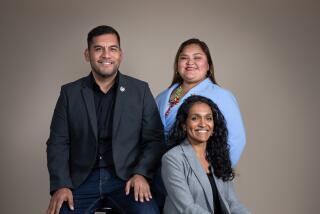Council Picks a New Mayor for Moorpark
- Share via
The Moorpark City Council on Monday night selected Mayor Pro Tem Thomas C. (Bud) Ferguson as mayor for the rest of 1986, filling a vacancy left by the resignation of James D. Weak.
Weak resigned June 23 after he was diagnosed as having leukemia, a cancer of the blood. He is undergoing chemotherapy at Los Robles Regional Medical Center in Thousand Oaks.
After unanimously making Ferguson mayor, the council named Councilman Danny Woolard as mayor pro tem.
However, the panel put off until July 21 a decision on appointing a fifth council member to fill the seat left vacant by Weak.
Ferguson, 67, who was elected to the council in 1984, has consistently opposed a citizens group’s proposals to set fixed limits on residential growth in the 3-year-old city of 16,000.
Rival Growth Plan
Moving to steal the thunder from the group’s initiative, the Moorpark City Council has proposed placing a less restrictive measure on the Nov. 4 ballot.
Using Ventura County population guidelines, the council’s initiative would seek to limit Moorpark’s population to 33,878 at the turn of the century, although there would be another ballot measure in 1994 to give voters a chance to decide whether to finish the plan.
Under the council’s plan, which was scheduled for debate Monday evening, building permits could be issued for an average of 411 dwelling units each year, contrasted with about 800 issued in the fiscal year that ended June 30, Ferguson said.
The initiative also would allow the council to slow residential construction if growth is viewed as having overwhelmed services such as police and fire protection, roads, schools and sewer and water facilities.
The council’s proposal follows the success of the Committee for Managed Growth in placing an initiative on the ballot to allow 250 new units a year through 1995, excepting projects for low-income residents and those of four or fewer units.
The conflict between council members and a residents’ group closely parallels the experience of Simi Valley, where last week the City Council added its own growth-limit and hillside protection proposals to measures that will be on the ballot.
“Somewhere along the line there’s a happy medium. We’re trying to come up with something the slow-growthers will buy,” Ferguson said.
“It’s too early in the game to curtail building,” he said. “Nobody’s going to come out here and build a factory if there’s no labor pool.”
Objections to the evolution of Moorpark from a quiet farm township to a traffic-choked city of commuters have dominated municipal politics since 1984, and seem sure to be at the center of three council races slated for November.
Slow-growth advocates charge that the city’s quality of life is suffering under the weight of its rapidly growing population.
The council’s proposed initiative demonstrates that the panel is “finally scared” about public backing for growth limits, said Bob Crockford, president of the Committee for Managed Growth.
More to Read
Sign up for Essential California
The most important California stories and recommendations in your inbox every morning.
You may occasionally receive promotional content from the Los Angeles Times.













